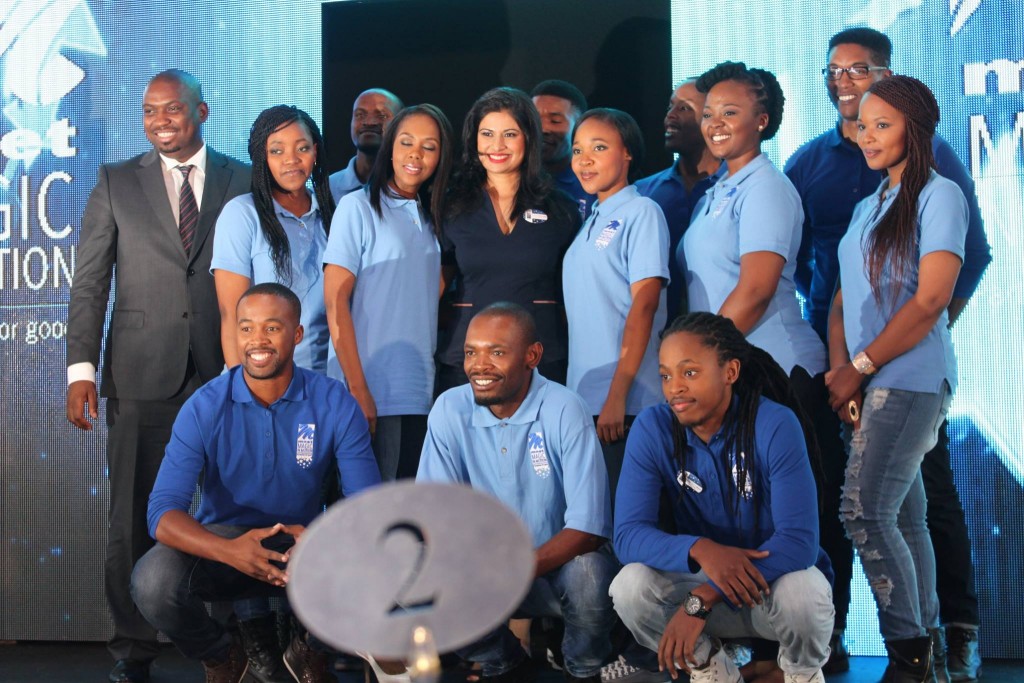Talented graduate joins M-Net Film Academy


12 of the country's top Film and Media graduates join the inaugural M-Net Magic in Motion Academy. Pictured above Deputy Minister Buti Manamela (back row, left) and M-Net Director of Corporate Affairs Kershnee Govender (centre).Photograph appears courtesy M-Net Magic in Motion Academy.
Thembalethu Mfebe has been selected to join the inaugural M-Net Magic in Motion Academy. Twelve of South Africa’s top Film and Media graduates were selected following a nationwide search for the best of the best. The M-Net Magic in Motion Academy internship is an innovative skills development initiative designed to train, mentor and fast track a new generation of content makers. Mfebe is the only UCT graduate to make the final cut in 2015.
After obtaining a Bachelor of Arts degree (Media and Writing) from the University of Cape Town in 2013, Mfebe completed an Honours degree in (Television Drama) in December 2014. A few short months later and following a rigorous screening process, he has landed his dream job, a 12-month internship at South Africa’s biggest satellite television broadcaster. Humanities News wanted to find out how this dynamic 23 year old has managed to achieve so much, in so little time:
HN: tell us a little about yourself
TM: I am originally from Welkom in the Free State. I was always drawn to television. When I was much younger, both my parents had full time jobs and I would always be glued to the TV after school. I used to draw pages and pages of stories illustrated by stick man figures in a comic book style. At this time I did not realise that they were rough versions of storyboards. Whenever my parents would come back home I would narrate the story to them accompanied by the stick figure cartoons. Throughout my high schooling career I enjoyed writing poetry and was obsessed with my art subjects. I started believing in my writing when people from my school persuaded me to perform poetry at School prize givings and I progressed to performing at government art festivals. Painting and drawing really influenced my understanding of composition as I moved from still images to moving pictures. For as long as I can remember, I always loved telling stories.
HN: What have you enjoyed most about the Film and Media programme at UCT?
TM: What I enjoyed most about the Centre for Film and Media Studies programme at UCT is that it opened up a world of other filmmakers for me, instead of just the Hollywood we all know. I learnt about the origins of film and TV and how the medium is used in different societies. I learnt how film was used as propaganda in Germany during the world war and the fall of the Berlin wall; how film has its role in history like retelling the stories of Patrice Lumumba and the struggles of liberation in Battle of Algiers; and unearthing so many South African films I overlooked like Cry, The Beloved Country, Drum and Yesterday. The program taught me analytical thinking that helps deconstruct scenes and critical thinking that makes me question everything about how it is made and why it is made. During my undergrad, Liani Maasdorp always pushed us creatively in our screen production class and we always tried to push the envelope. The course administrator, Petros Ndlela always chased after me to hand in my essays on time when I was too preoccupied with my practicals. What I gained most from my honours course is finding my own artistic voice. My supervisor, Revel Fox, not only challenged me creatively, but really challenged me to find the stories from inside and push out my vision. For that, I am very thankful.
HN: Having also completed your Honours degree in Television Drama, how will you use this knowledge and skill in your career?
TM: With the knowledge I acquired, I have an understanding of the production process from preproduction, production and post-production. I have a strong theoretical understanding of the production workflow and I have had the chance to shoot short films and documentaries. As I go into the working world I can build on this foundation so that I can hone my skills. UCT has given me the skill to produce high production value products on a micro-budget. I am looking to sell my services as a writer, director, editor or to join a camera department. I would very much like to thank the MICT SETA for funding my honours year’s tuition. I would not have had the opportunity to further my studies without them.
HN: Tell us about your journey to the M-Net Magic in Motion Academy internship?
TM: I have always tried to gain experience in the industry though out my university career. I have been a runner on shows such as Club Culture, Miss South Africa, and corporate events such as the Total (garage) Awards. My close friend, Kati Mashele, was the first person to tell me about the M-Net Magic in Motion Academy. A few family members and other friends recommended I try it out as they thought it was meant for me. I finally saw the advert on TV and asked my faculty to apply on my behalf. The Centre for Film and Media Studies recommended me and I went to my first interview when I had just finished my dissertation. I remember it being the longest interview I had ever been in. I got my chance at a much shorter second round of interviews with Tsepang Naheng And Mr Heaney and sure enough I got a call to move to Johannesburg to join 11 other top graduates from around the country to be the first in the M-Net Magic in Motion Academy at the beginning of March. How could I pass up a chance to gain experience jumping around the top productions around the country for a year under the guidance of Bobby Heaney - the creator of the first soapie in the country, Egoli. We have had numerous masterclasses with industry leaders where I have learned so much and shaken the hands of people I want to be like. It has been 3 months and I have already been on the sets of Power Couple, Miss South Africa, Cape Town Film Studios, Waterfront Film Studios, Isibaya, Ashes to Ashes and Carte Blanche. Meeting producers and directors like Angus Gibson, John Barker, Jahmil Qubeka, Thabang Moleya, Shona Ferguson, Roberta Durrant, Bobby Heaney and others who have made me able to see my path more clearly as I see myself one day amongst those names. Hard work and staying humble is the key. I still have another 9 months of learning from the best guys in the business. I am exactly where I need to be.
HN: Your film Car Guardian has been selected for the Durban International Film Festival – what does this level of professional recognition feel mean to you?
TM: The fact that my honours short film, Car Guardian, has been officially selected to be part of the Durban International Film Festival 2015 makes me very happy. It is the first film I have written and directed listening to my artistic voice and for me it signals that I am on the right track. I am very fortunate that I was able to achieve this while still studying. It also challenges me for my next work to be even better, to get invited to many more festivals in coming years and hopefully lift an award. The professional recognition helps strengthen my CV a bit as it is a testament to my ability to produce quality work.
HN: What, in your opinion, is the role and contribution of African filmmakers?
TM: Africa has a rich culture of storytelling. From rock paintings to sharing stories around the fire by poets, musicians and praise singers. I consider myself a modern day African griot armed with a camera. Film and TV has a significant role in South Africa as it retells our stories. It is not a medium that can only entertain, it can also educate and be used to archive important parts of our history. African filmmakers are also helping out with the economy. The rest of the world is starting to take notice that we are on par at a skills level and we have great locations too. Places like the Cape Town Film Studios and Waterfront Film Studios are attracting international productions to South Africa and continue to increase our credibility. It also encourages international relations. We have the studios and the skills to perform on the international stage. All we need is the support of South Africans to uplift our stories.